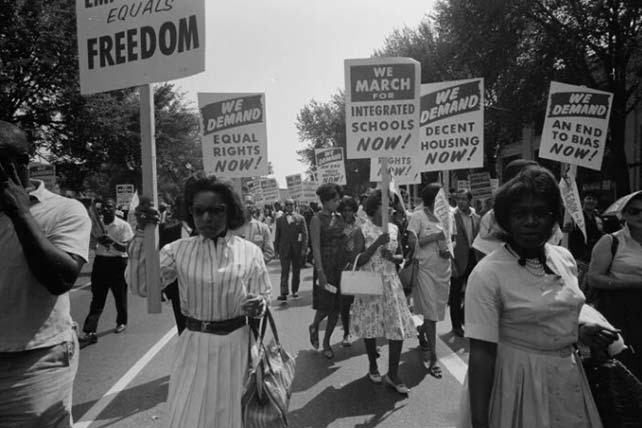(RNS) — In front of the crowds and the cameras, the speeches of the Rev. Martin Luther King Jr. and other men loomed large 60 years ago at the March on Washington.
But the women, including those of faith, who played roles in its organization, its music and its news coverage were mostly left off the official program.
“They did not accept their exclusion quietly,” stated the National Museum of African American History and Culture, in a description posted on its website ahead of the anniversary. “Individuals like Anna Arnold Hedgeman of the National Council of Churches strategized with others and convinced (organizer Roy) Wilkins to include a female speaker. Only one woman spoke: Daisy Bates, NAACP chapter president and an advisor to the Little Rock Nine.”
RELATED: 10 Speaking Lessons From Dissecting a Martin Luther King Jr. Speech
The Rev. Barbara Williams-Skinner, who came to Washington as the first female executive director of the Congressional Black Caucus a decade after the march, recalls prominent Black women leaders of that era sharing with her their “anger and angst” of having to sit silently that day.
The co-convener of the National African American Clergy Network said that, although they may not have had much of a voice that day, she is certain of the influence of women, famous and unfamiliar, on the march’s success from behind the scenes.
“If anything got organized, the women were putting in extra time,” she said, “even though they faced the unfairness of not being able to speak.”
As the nation marks the 60th anniversary of the March on Washington, Religion News Service talked to three women — a secretary in King’s office, a schoolgirl who became a bishop and a high school grad who helped escort Malcolm X, about their memories and roles in that historic moment.
The interviews were edited for length and clarity.
Willie Pearl Mackey King
Willie Pearl Mackey King at her desk at the Southern Christian Leadership Conference office in Atlanta in 1963. Photo courtesy of Willie Pearl Mackey King
Willie Pearl Mackey King was the personal secretary and administrative assistant to the Rev. Wyatt Tee Walker, executive director of the Southern Christian Leadership Conference. She worked closely with Martin Luther King Jr. (no relation), who was a co-founder of the SCLC, as well as with Walker and others who organized the march. She arrived in D.C. weeks before the gathering and left in time to watch it on TV in Atlanta with SCLC staffers. King, 82, is a member and former trustee of a Baptist church in Silver Spring, Maryland.
What was your role in the plans for the March on Washington?
I came to Washington, probably the first time six weeks before the march because Wyatt Tee Walker was the lead person on Dr. King’s staff planning the march with a lot of help. His immediate staff from Atlanta were very much involved looking at logistics, thinking about crowd control, how many people we’re expecting and, certainly, they did not expect, from everything I heard, the number of people that turned out. They didn’t expect 250,000 people. No. No. No. They were thinking of a much smaller group from what I could hear, what I saw discussed.


